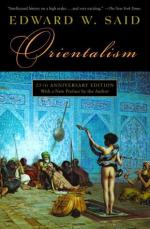|
This section contains 18,251 words (approx. 61 pages at 300 words per page) |

|
SOURCE: “‘I Know Thee Not, I Loathe Thy Race’: Romantic Orientalism in the Eye of the Other,” in ELH, Vol. 58, No. 3, Autumn, 1991, pp. 657-99.
In the following essay, Meyer discusses how the recurring theme of overpowered Eastern women in Romantic Orientalist texts reflects cultural, political, and ideological struggles between East and West in the nineteenth century.
I must go to the Orient: all great glory comes from there.
—Napoleon
Is it some yet imperial hope That with such change can calmly cope? Or dread of death alone? To die a prince—or live a slave— Thy choice is most ignobly brave!
—Byron, “Ode to Napoleon Buonaparte”
Napoleon's Egyptian campaign, conceived in a spirit of rivalry to British imperialism in India, extended French military ambitions beyond the limits of Europe and initiated a legacy of colonialism in Africa that would produce, among other less commendable cultural artifacts, a rich...
|
This section contains 18,251 words (approx. 61 pages at 300 words per page) |

|


